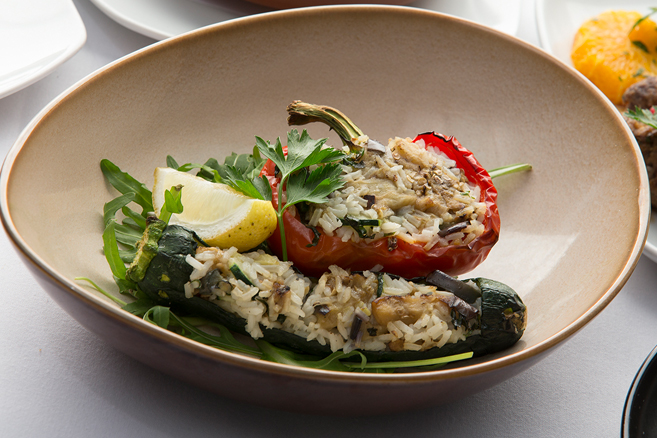
Think Mediterranean cuisine and the mind willingly turns to fresh and zesty flavours like lemon, yogurt and olives, succulent seafood or meats tended to with love, and slow-cooked to flavoursome supremacy.
These are all essential elements of the Greek cooking style which dates back 4000 years, but there’s so much more to cuisine than just ingredients, and here’s why…
Rich Mediterranean history
Greek cuisine has a culinary tradition that is part of the history and the culture of Greece.
Based on what can be grown and sourced locally, its flavours change with the season and the geography of the region, but essential elements have long included olive oil, lemon and wine. Wheat is also a traditional ingredient lending itself to semolina pastas, flour and bread.
While Greek food has influenced others, and undoubtedly others have influenced Greek cuisine, at its heart is readily available produce that is grown and sourced within the local region.
Fresh produce
Vegetables and fresh produce have traditionally held a central position in the creation of Greek food, and cooking is traditionally based on the flavours of what’s readily available and in season. Favoured vegetables include tomato, eggplant, zucchini, and onions, and a select array of herbs including oregano, dill, bay leaves, garlic, basil, and mint.
Meats and seafood
Again location has dictated the type of meats used in Greek cooking, with the climate and terrain favouring the breeding of goats and sheep, rather than beef. This makes lamb one of the key meats used in meals.
Communities along Greece’s lengthy coastline were influenced by the range of seafood available. From sardines, to anchovies, calamari, cuttlefish, octopus, lobster and a vast array of fish, the Aegean and Mediterranean Seas were bountiful in their supply and variety of seafood.
Cheese and yoghurt
While for many Feta immediately springs to mind, Greece boasts a huge array of cheeses with flavours that range from mild to strong, and textures that vary from creamy to hard or crumbly. Most are created using sheep or goat’s milk, and the tradition of making them dates back centuries.
Meanwhile Greek yoghurt with its smooth texture and rich flavour has become one of the country’s most successful exports.
Warm Mediterranean hospitality
But it’s not just the ingredients that influence the style and flavours of Greek cooking, it’s the traditional methods used in preparation and the ethos behind it. Preparation involves minimal refinement where the flavours and ingredients are encouraged to speak for themselves.
Eating is a pastime to be enjoyed, never rushed, and an experience that is shared at leisure with family and friends.
Health benefits
With its attributes of fresh fruit, vegetables, healthy fats as found in olive oil, seafood, and only a select use of meats, the Mediterranean diet is renowned for its health benefits.
Coupled with a leisurely eating style, the Mayo Clinic notes it has been shown to reduce the risk of heart disease, cancer, and Alzheimer’s and Parkinson’s.
“For these reasons, most if not all major scientific organizations encourage healthy adults to adapt a style of eating like that of the Mediterranean diet for prevention of major chronic diseases.”
About George’s
George’s Mediterranean Bar and Grill continues the ethos of using the finest fresh ingredients in flavoursome meals designed to be shared with family and friends.
Join us at our picturesque Sydney location in Darling Harbour to experience all the joy, tradition and warm hospitality that encapsulates Greek cuisine.






